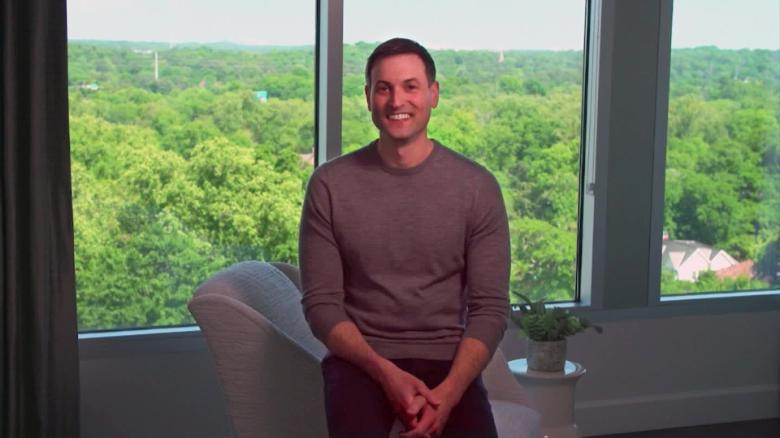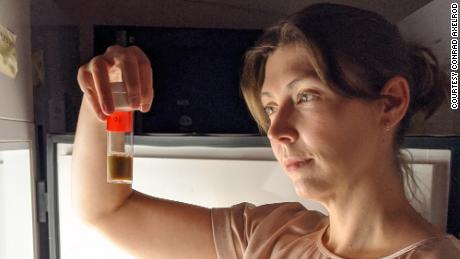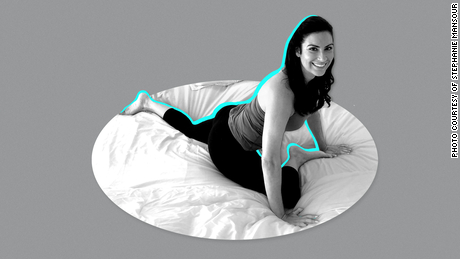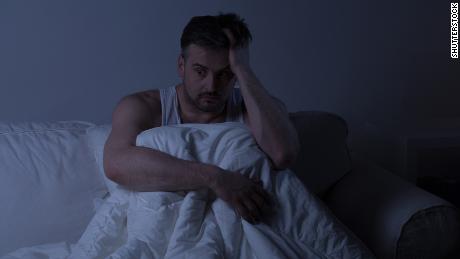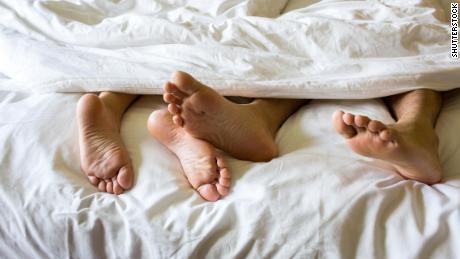(CNN)Like many moms, Sofia Axelrod found the lack of sleep really hard after giving birth. But unlike many moms, she refused to accept that the exhaustion was inevitable.
"Sleep deprivation is so detrimental," said sleep consultant Axelrod, who is a neuroscientist at Rockefeller University in New York. "I didn't just want to suck it up and think, yeah my life for now on is going to be permanently damaged."
The mother of two was inspired to dig into the research, looking for evidence-based tactics to get young children and their parents to sleep through the night. The results of her search can be found in her new book, "How Babies Sleep: The Gentle, Science-Based Method to Help Your Baby Sleep Through the Night."
Axelrod learned that parents' brains -- mostly moms -- are wired to care for a young child. Nighttime noises, tame or savage, will jolt many of us awake. Even when the baby is capable of self-soothing. Even when we are so, so tired.
But if we let our instinct to care for our young children reign supreme, and get no sleep as a result, nobody wins. "If mama ain't happy, ain't nobody happy," the old saying goes; and sleep-deprived mamas are not happy.
"I wanted to be happy, and I need sleep to make me happy," Axelrod said. "So I said, how do I make it happen?"
Axelrod spoke to CNN about how to maximize everyone's sleep, from the baby years on. She also had a few thoughts about which pandemic habits might be getting in the way of a good night's sleep, and which ones, surprisingly, are not.
This conversation has been edited and condensed for clarity.
CNN: Humans instinctively respond to light and get sleep cues from natural and artificial light. What should parents use for light to signal "sleepy time" to their kids?
Sofia Axelrod: The light bulb went off in my head, pardon the pun -- it's intended -- when I was working in the lab with fruit flies. When we want to test their sleep without waking them up, we use a red flashlight. Every other type of light wakes them up.
I was pregnant, and I realized that the same is true for humans. We are largely insensitive to red light. So I bought a red light bulb (Ed. note: Not all red light bulbs are actual red light, so shop carefully) and started using it during nighttime feeds when my baby was born, and it worked. The baby wouldn't get the signal from the red light that it's time to wake up.
CNN: How does light signal to the brain that it's time to sleep or time to wake up?
Axelrod: We have these special cells in the back of our eyes that have special light receptors. So whenever you're exposed to light, in the morning or the evening, they signal to your body that it's time to be awake. They reset your body clock.
You can use light to help train your body that this is bedtime, and this is morning time.
CNN: Can introducing red light and limiting overall light exposure help older kids fall asleep more quickly at night?
Axelrod: Yes. We actually have a red light in our living room that we put on an hour before bedtime.
Subscribe to CNN's Sleep, But Better Newsletter: Want the best sleep of your life? Sign up for our newsletter series for helpful hints to achieve better sleep.
CNN: Can dimming lights in the evening help get us to sleep?
Axelrod: Yes, though it's really important to be consistent with timing. We need to work with our inner clock. Also, turn the red light on or dim the lights an hour before bedtime. This is how long it takes for the sleep hormone that is dependent on light to be released.
CNN: Though no matter how careful we are with lights, babies will still cry in their cribs. What's your take on sleep training?
Axelrod: Honestly, I regret calling it "sleep training" in the book because those two words have such a negative connotation. That said, there are longitudinal studies showing that allowing your child to cry a little and learn to self-soothe has no detrimental effects.
I recommend a middle ground. Suppress your mom guilt and let them cry for 90 seconds before you go in. The research is crystal clear -- even just 90 seconds will teach them to fall asleep.
People don't realize this, but babies are not born knowing how to fall asleep. It's our job to teach them.
CNN: What do you think about co-sleeping?
Axelrod: This is a very personal decision. But the research has shown that if you are in the same bed as your child, it's much harder to create that short delay between when the baby wakes up and the parent soothes the baby, and the delay is important for learning how to self-soothe.
If a parent thinks they need that closeness, then go for it. But the research does show that kids who co-sleep take longer to learn to sleep through the night.
CNN: What about naps? Last year my son took a mandtatory nap at his preschool, and then was staying up past 10 p.m. every night. Should we never wake a sleeping child?
Axelrod: I had that exact experience at my child's day care. I tried my best to use my credentials to get them to change their policy so naps weren't required, but it didn't work, and I ended up having my nanny go early to pick up my daughter so she wouldn't nap there. It was either that or let her sleep there and have her go to sleep at midnight.
Science is very clear on this point: Daytime naps control toddler sleep. Control! Kids only need so much sleep in a day. If your kid isn't going to bed at night, cut that nap. Either make it shorter or cut it altogether.
CNN: There seems to be a critical mass of people who believe that it's better for kids to go to sleep early. But some kids are night owls. Are they OK?
Axelrod: This is so politicized -- that somehow people who go to bed late and wake up late are still considered lazy. But there is a genetic basis for circadian rhythms. One out of 100 people have a mutation in their clock genes that alter their day length, and as a result they go to sleep later. It's not detrimental, and nothing is wrong as long as they are getting enough overall sleep.
CNN: Many families are a bit off their sleep schedules during the pandemic and going to bed later. So they'll be fine?
Axelrod: It doesn't matter if you go to bed later. What does matter is day-to-day variation. I don't recommend doing something different over the weekend than during the week or when you are on vacation. Your circadian clock responds to time cues, and it helps regulate everything, from when you go to sleep to when you are ready for lunch. You want to keep this regular.
CNN: What about television at night? I've heard that you need to stay far away from all things backlit in the evening. But sometimes 30 minutes of TV helps us settle down.
Axelrod: Screens can be fine at night. Just try to dim it as much as possible, and generally try to avoid them an hour before bedtime. Though people do have different sensitivity to light. Some of us might be fine watching them right before bed without any decrease of our melatonin production or impact on our sleep overall.
CNN: Any solutions for Covid anxiety-related nightmares or wake-ups in our kids?
Axelrod: It's important to remember that our kids are sensitive to what is going on, and they may not know it or even show it. It depends on the age, but overall it's important to shield our kids from our anxieties and the news to some degree so they can sleep.
Get CNN Health's weekly newsletter
Sign up here to get The Results Are In with Dr. Sanjay Gupta every Tuesday from the CNN Health team.
There is a strong correlation between not getting enough sleep and depression, and so the sleep deprivation can end up making them feel even worse if it continues. Parents need to try to provide the comfort their kids need, so the kids' anxieties don't take over and keep everyone from sleeping well.
